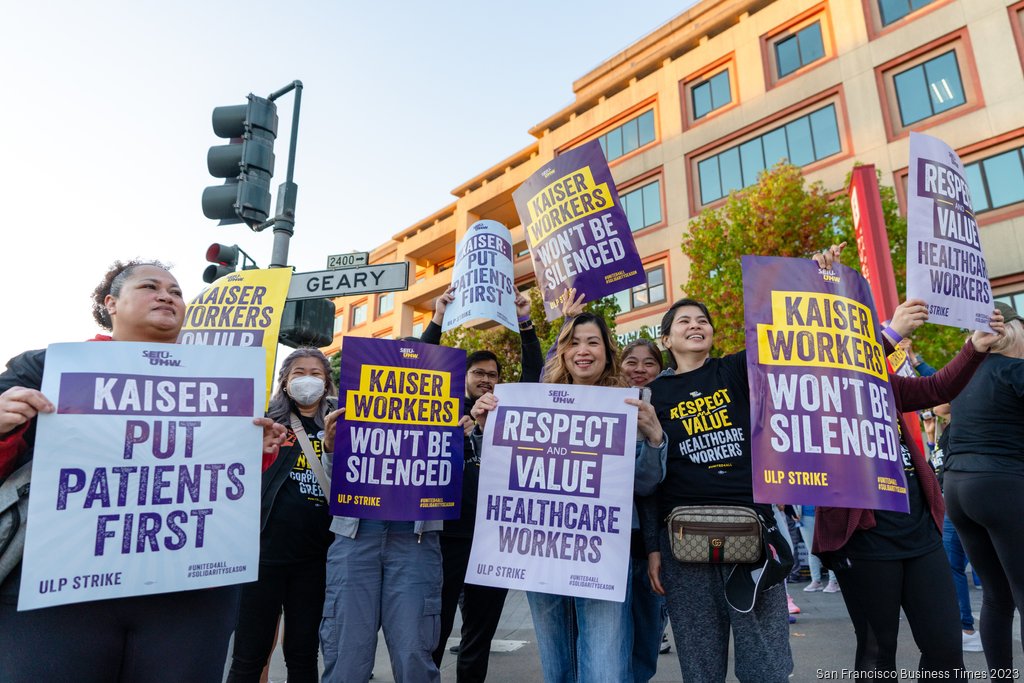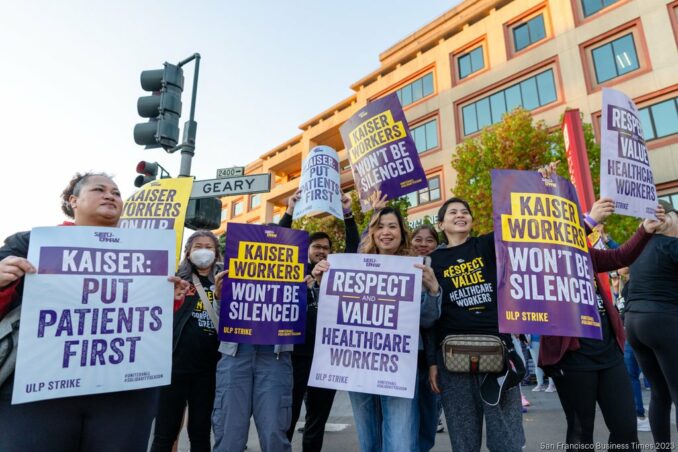

Health care workers strike Kaiser Permanente San Francisco Medical Center, Oct. 4, 2023.
Robert Wood Johnson University, Kaiser Permanente strikes
Registered nurses at Robert Wood Johnson University Hospital in New Brunswick, New Jersey, have taken action against corporate greed and exploitation as well as union-busting tactics. Their strike is into its third month. The 1,700 nurses, represented by United Steelworkers Local 4-200, are demanding safe staffing. Research has proven that adequate nurse to patient ratios save lives.


Health care workers strike Kaiser Permanente San Francisco Medical Center, Oct. 4, 2023.
The pandemic was the match that lit the fire around safe staffing. Nurses were pushed to the brink and were no longer willing to put their patients’ lives and their own well-being and professional licenses at risk. Since the strike, RWJU bosses have shown that they undervalue their nurses by suspending health benefits and limiting picket lines at hospital entrances.
These union-busting tactics are reminiscent of those deployed against the heroic 10-month strike of the nurses at St. Vincent Hospital in Worcester, Massachusetts. These nurses, members of the Massachusetts Nurses Association union, finally ratified a new contract in January. Theirs was the longest nurses strike in Massachusetts history and won staffing protections.
Another historic labor action happened from Oct. 4-7 when Kaiser Permanente workers staged a three-day strike. A coalition of unions representing licensed practical nurses, lab technicians and other hospital personnel — 75,000 in all — went up against the hospital corporate giant in what was the largest strike by healthcare workers in U.S. history.
Similar to registered nurses elsewhere, Kaiser union members are fighting for patients and demanding safe staffing and adequate compensation. The three-day strike took place across sites in Colorado, Washington, Oregon and California, with a one-day strike in Virginia and Washington D.C.
Grad student union drive keeps growing
Graduate student workers continue to fight back against institutions that exploit their labor. These student workers historically put in long hours of work and advance the prestige and coffers of major learning institutions, but they are paid a pittance.
However, this current generation of student workers is not standing for it. Across the country, grad students are organizing and forming unions to demand adequate compensation and improved working conditions. Last week, the University of Maine got their wake-up call when the National Labor Relations Board certified that the Maine Graduate Workers Union, part of the United Auto Workers (UAW), won their union election. The union represents 1,000 graduate assistants, research assistants and teaching assistants at the university.
“Our work powers the educational and research mission of the University, and was instrumental in UMaine receiving the status of an R1 rated research university. In short, UMaine works because we do,” said Em Sowles, a fourth-year Ph.D. candidate and research assistant in the physics department. “But for too long, we have struggled with low and inconsistent pay, substandard health benefits and the need for a voice at work. Today we are proud to have formally secured a seat at the table, so we can begin to improve our working lives through legally-enforceable contracts.” (uaw.org)
University of Pennsylvania graduate student workers plan to be unionized soon as the Graduate Employees Together of UPenn (GET-UP), also part of the UAW. Among GET-UP demands — along with a reasonable workload and improved compensation — are freedom from harassment and discrimination in the workplace, protections for international students, and justice for Philadelphians who have long suffered from decisions made by UPenn that lacked any commitment to the well-being of city residents.
UAW strikes Blue Cross
UAW members who work for Blue Cross Blue Shield Michigan share similar grievances with their union siblings in the auto industry. Shortly before the strike against the Big Three auto companies began, 1,000 workers at the health insurance giant took to the picket line in Detroit, Lansing and other Michigan cities on Sept. 12. These workers handle claims for the corporation, helping individuals navigate the complex, confusing and frustrating industry that feeds off the pain and suffering caused by a profit-driven healthcare industry.
BCBS Michigan reported $360 million profit in 2021 and CEO Daniel Loepp’s 2021 total compensation for exploiting workers and sick people was $15.6 million! The workers are demanding the end of the two-tier pay scale. Under the current contract, a new hire at BCBS Michigan would need to work 22 years before they reached the top of their wage scale.
Solidarity with the UAW members at BCBS Michigan!
In its ongoing genocidal campaign against the Palestinian people, Israel used drones May 2 to…
Palestinian and regional factions condemned the Israel Occupation Forces’ attack today on the Al-Dameer (Conscience)…
A message for May Day: ‘Workers of the world unite, Palestine is our fight!’ International…
Africa is rising, the days of colonialism are finished: This is the call being echoed…
Several immigrant groups and their supporters rallied outside the federal courthouse in Philadelphia on May…
Thousands of construction workers and teachers in at least seven provinces throughout Panamá took to…